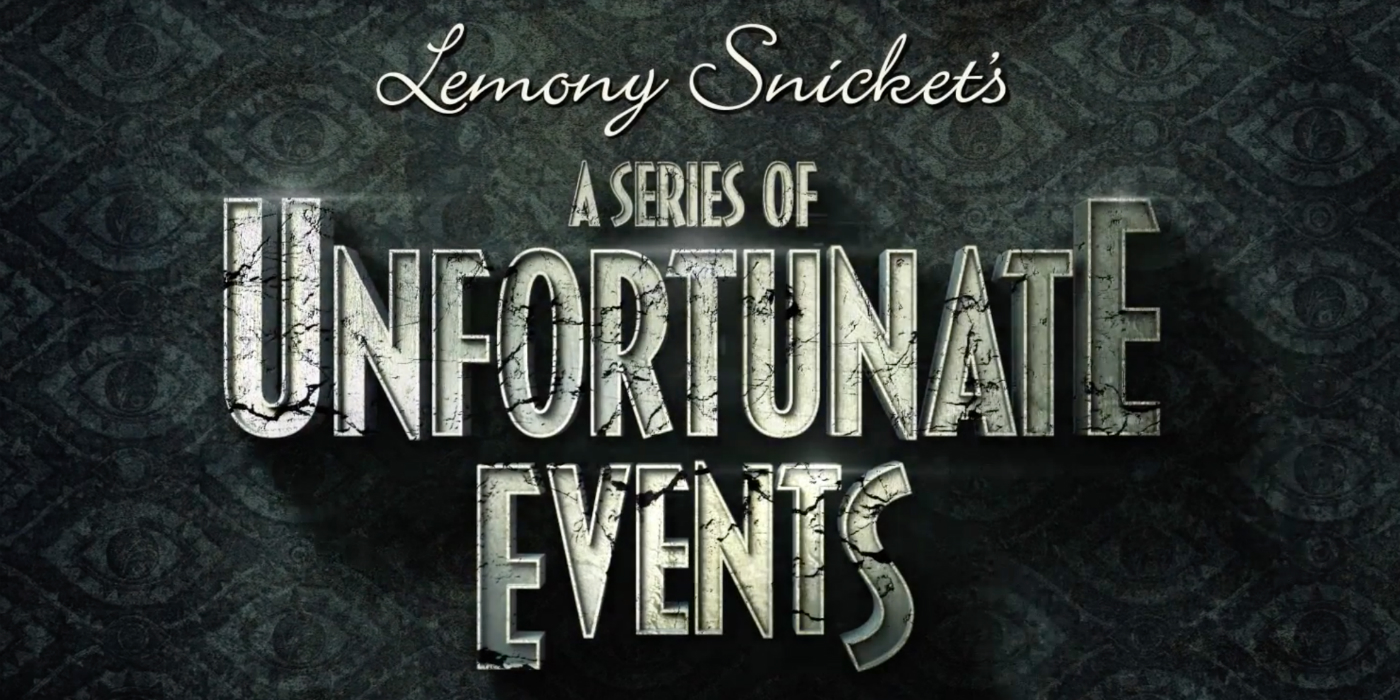NOTE: This review may contain mild spoilers for the first season of, “A Series of Unfortunate Events.” That said, the review is written to accommodate those who have not yet watched the series, and as such, will avoid discussion of major plot developments.
Back in the late 90’s and early 2000’s, along much of the same window of initial popularity as Harry Potter in fact, there was a series of childrens’ books that was also taking the world by storm, albeit to a more subtle degree. A Series of Unfortunate Events, the morose 13-book chronicle of the ill-fated Baudelaire orphans, saw significant popularity among young readers back in those days, particularly due to the playfully somber warnings and self-referential laments of writer, Lemony Snicket, a.k.a. Daniel Handler. The series was even popular enough to receive a feature film adaptation of the first three books, released by Paramount and Dreamworks as Lemony Snicket’s A Series of Unfortunate Events in 2004, though sadly, despite reasonable box office performance, and even an Oscar win for Best Makeup, plans for sequels to the movie adaptation ended up being scrapped, due to Paramount being unable to get plans going in time, on account of prolonged corporate shake-ups. By the time that was sorted, the big screen Baudelaire actors were too old to play their parts, leaving the movie series dead before it could reach a second installment.
Fortunately, from the ashes of Paramount’s failed movie franchise, A Series of Unfortunate Events has found a surprising new home; Netflix! The world’s biggest streaming platform has gotten ahold of the novel series’ rights, after they presumably lapsed at Paramount, and has done what Paramount failed to do, namely kick-start a reliable, fully-featured adaptation of Lemony Snicket’s celebrated novels, this time in television form. Better still is that the first season of A Series of Unfortunate Events ultimately proves to be even better than Paramount’s movie adaptation overall, feeling more clever, more timely, and even truer to the source material, even taking much of the dialogue verbatim from the source novels. Going beyond that, the decision to convert the series to television also feels all around better, with two episodes of the eight-episode first season each devoted to one particular book in Snicket’s series, giving the stories much more room to breathe and develop in contrast to Paramount’s movie, which crammed three books into one live-action adaptation that didn’t even span two hours in length.
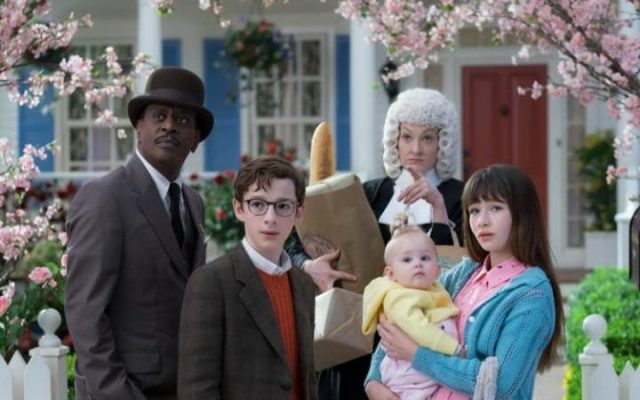
Ironically, despite A Series of Unfortunate Events constantly and playfully claiming it’s a sad and depressing tale of woe and misery, the show could actually best be described as a fantastical comedy. There’s considerable satirizing of the idea of sadness throughout the show, particularly in the fictionalized portrayal of author, Lemony Snicket within the show itself, whose po-faced, deadpan charm is realized perfectly by Family Guy’s Patrick Warburton. Warburton’s Snicket often interjects at various points in each episode to directly address the viewer, operating as an undercover investigator of sorts in the affairs of the Baudelaire siblings, one that balances insight and wisdom with a light-hearted sense of casual whimsy and even nonchalant self-deprecation. Naturally, the presence of Warburton’s Snicket as this kind of character device is also a very inspired way to tie this TV adaptation into the creative wordplay that so wonderfully defined the source novels.
The Baudelaire siblings themselves are also effortlessly charming, and consistently inspiring, even when their polite and intelligent demeanours become gradually more tested as the season goes on. The siblings consist of eldest mechanical-minded sister, Violet, played by Malina Weissman, literature-minded middle child, Klaus, played by Louis Hynes, and sharp-toothed, sassy infant, Sunny, played physically by Presley Smith. Violet and Klaus are obviously the ones that mostly move the plot forward, using inventions and book smarts to stay ahead of their pursuers, though even Sunny manages some pretty hilarious, if blatantly unrealistic victories for the Baudelaires. Sunny’s ‘dialogue’ can also offer some of the show’s biggest laughs at times, with her ‘speech’ displayed as large green subtitles, while voice actress, Tara Strong provides baby cooing noises to give Sunny some clever personality, even as an infant that can’t directly speak.
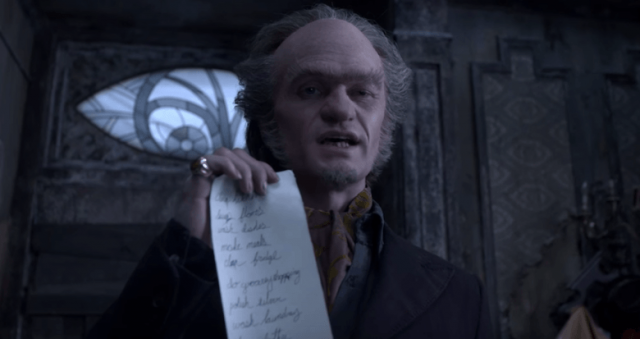
Obviously though, much of the dark, twisted, and yet strangely charming humour from A Series of Unfortunate Events comes from the headlining performance of Neil Patrick Harris as the show’s main villain, Count Olaf, a filthy, untalented theater actor with a troupe of eccentric goons that assist him in attempting to swindle the large fortune that has been left to the Baudelaire children. The fortune is sealed until Violet turns 18, but that doesn’t stop Olaf from enacting all sorts of schemes across the first season’s eight episodes, most of which involve exploiting Olaf’s panache for hare-brained disguises. The Baudelaire kids can always easily see through Olaf’s and his troupe’s ridiculously ineffective disguises, though unfortunately, they always seem to fool any adults involved, particularly supposed ‘#1 banker’, Mr. Poe, played by K. Todd Freeman, who is in charge of helping the Baudelaire siblings make their way to each new quirky guardian between major story arcs.
Harris is truly the force that brings together A Series of Unfortunate Events however, even serving as a lead producer, as well as singing the show’s fantastic and highly catchy intro theme song, “Look Away.” Harris’ Olaf isn’t quite as outwardly imposing and ghastly as the Jim Carrey portrayal of the character from Paramount’s movie adaptation, but compensates by being especially funny and memorable, with Harris playing up the character’s obliviously arrogant silliness, while managing to balance that with a genuine sense of deviousness, creepiness and frightful determination. One has to wonder why Harris’ especially ludicrous Olaf is never caught, which sometimes stretches the show’s credibility, but Harris himself is always fun and lovable, even as the villain. I suppose that we wouldn’t have a show if common sense led to his inevitable capture so soon anyway.
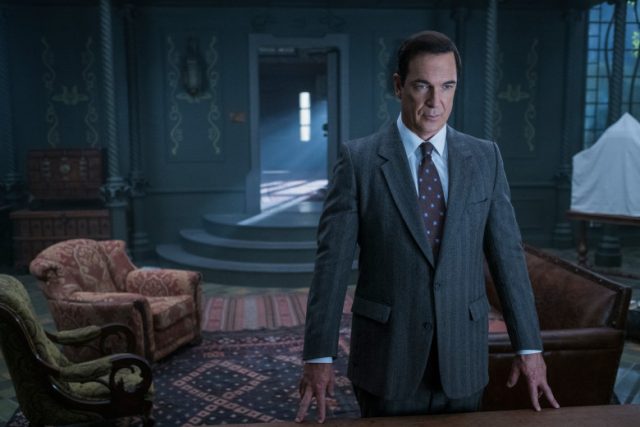
We’re only just beginning to dig into the Baudelaires’ struggles and Olaf’s schemes as well, since the first season of A Series of Unfortunate Events only covers the first four books in the collection; The Bad Beginning, The Reptile Room, The Wide Window and The Miserable Mill, with all but The Miserable Mill also providing story material for Paramount’s former movie adaptation. As I said, the show is also very faithful to Snicket’s novels, to the point where it even lifts entire dialogue snippets from them! Some lines are added and updated however, particularly some amusing in-jokes about Netflix and streaming services in general, as well as a few clever contemporary references that do help to update the show’s subject matter a bit more in 2017, such as Snicket making a hilarious nod to the 2008 financial crisis in one episode.
As with the source novels, A Series of Unfortunate Events is also a rare example of a high-profile Netflix Original Series that can be enjoyed by children as much as adults. The show is primarily advertised on Netflix’s main adult page, where it no doubt aims to primarily appeal to young twentysomething and thirtysomething adults that were children when they first read the books in the 1990’s and 2000’s, but the series is also quite safe for kids of the present day too. Any kids watching might want to be around nine or ten at minimum though, considering that the show still does have a handful of creepier, darker scenes that might still be too upsetting to a child that’s in or barely out of the kindergarten stage.
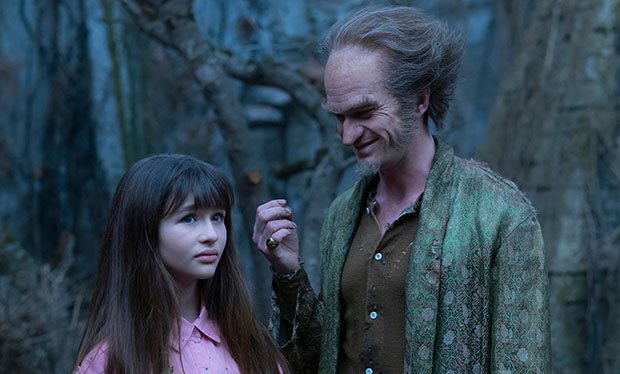
Still, it’s commendable that this show is so committed to capturing even the darker moments of its otherwise kid-friendly source novels, and beyond a few real head-scratching story turns that don’t translate as effectively to live-action, it’s difficult to find anything to truly complain about with A Series of Unfortunate Events. This superb new show easily joins Trollhunters as another rare, but undeniably family-friendly home run for Netflix! Between excellent sardonic humour, consistently great performances, and a beautifully-crafted sense of style and wit that perfectly emulates the progression and feel of the source novels, A Series of Unfortunate Events comes highly recommended to any and all Netflix subscribers, regardless of whether they’ve read the source novels or not. Those who have read the books will get even more out of the show of course, but even if this is your first proper encounter with A Series of Unfortunate Events (or perhaps you saw the movie in 2004 and never read the books), rest assured that there is nothing unfortunate about how this live-action TV adaptation turned out!

